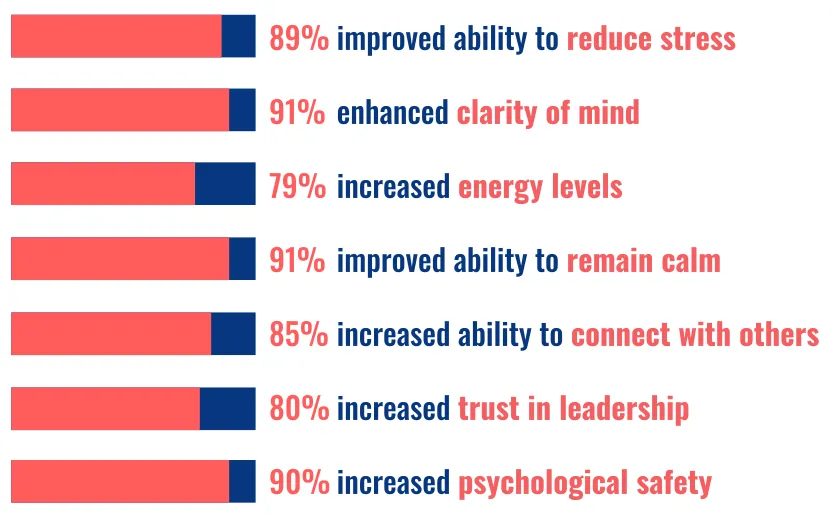Mindful Transformation for a Thriving Future
The Future of Work is Human: Awakening Leadership, Transforming Workplaces

The world of business is at a turning point. Technology accelerates faster than human capacity, teams are disconnected, and leaders struggle to create meaning in a results-driven system. Yet there is another way—a way that integrates wisdom with action, courage with compassion, and business success with human flourishing. In an age of rapid disruption, the future of work depends on helping people stay centered amid unpredictability.
At Connected Business, we believe real transformation starts from within. The future of work depends on conscious, emotionally intelligent leaders and resilient, trust-filled teams. Through our Mindful Transformation programs, we empower organizations and individuals to build workplaces where leaders inspire, people adopt innovation, and collaboration thrives on a foundation of trust.
We’re here to spark that transformation.
The Call for a New Culture
We live in times of great uncertainty and rapid change. Businesses face constant pressure to adapt, innovate, and perform at increasing speeds. Yet the greatest barrier to success is not strategy or technology—it is the human dimension:
🔹Leaders Overwhelmed by Complexity – making reactive rather than visionary decisions
🔹Teams Lacking Trust and Alignment – Stuck in silos rather than working together
🔹Employees Disconnected from Purpose – leading to burnout, disengagement, and high turnover
Organizations today don’t just need better strategies; they need courageous leadership, genuine human connection, and cultures that foster psychological safety, resilience, and authentic collaboration.
This is where we come in.
The Mindful Transformation Journey:
From Self- to Co-Leadership
Transformation does not happen in isolation. It begins within, moves outward to our teams, and finally shapes the culture of an entire organization- transforming business as a force for good.

Step 1: Self-Leadership – The Inner Foundation
Search Inside Yourself
All change begins with ourselves. Self-awareness, emotional intelligence, and mindfulness are no longer optional extras—they are the bedrock of clarity, focus, and open communication.
Through the Search Inside Yourself (SIY) program—the globally acclaimed program originally developed at Google—you will:
Develop Emotional Intelligence & Resilience to lead yourself with true clarity
Cultivate Mindfulness to remain composed and resilient under stress
Strengthen Communication for navigating workplace challenges with confidence
“Once individuals awaken their own leadership from the inside, they naturally uplift those around them.”

Step 2: Co-Leadership – Thriving Together
Elevate Your Team Program
No one can thrive in isolation. Real leadership emerges when it’s shared—when trust, collective accountability, and shared wisdom come to life. In this program, we train teams to:
Build Psychological Safety, so everyone feels safe to take risks and spark innovation
Enhance Collaboration through clear, values-driven communication
Move Beyond Ego to co-create solutions and celebrate shared success
Strengthen Resilience Under Pressure, so teams stay grounded, adapt quickly, and innovate together—even in high-stakes, fast-changing environments
“High-performing teams aren’t built on control—they flourish through trust, openness, and a unified sense of purpose."

Step 3: Mindful Leadership – Shaping the Future
Lead With Purpose
Transformation is complete when leadership centers on service, not power. Organizations need leaders who are strategic and results-oriented—yet deeply connected to their people, their values, and their broader impact on the world. In this program we focus on helping:
Leaders Develop Vision and clarity in the midst of complexity
Organizations Nurture Cultures of trust and psychological safety
Executives Foster Human-Centered Workplaces where high performance and well-being go hand in hand
“When leaders shift from command-and-control to courageous, people-focused leadership, companies become engines of innovation, growth, and meaningful success.”
Work With Us: Bringing Humanity Back to Work

We believe that organizations are not just systems of productivity but ecosystems of human potential.We train individuals, teams, and leaders to:
✔ Build emotionally intelligent workplaces where people feel seen and valued
✔ Strengthen resilience to navigate rapid change with confidence
✔ Transform Workplace Culture from transactional to deeply human-centered
Because in the end, business is not just about profit—it’s about people.
Ready to start your transformation?
Mindful Transformation Isn’t Just About
Making Work Easier
It’s about shaping a culture where people thrive, collaborate with trust, and remain resilient in the face of fast-paced, modern challenges.

For Businesses: Creating an Engaged, Adaptable Workforce
Managing change, fostering adaptability, and preserving team resilience can feel like a juggling act. You understand these skills are critical, but how do you embed them effectively?
That’s why we developed the Mindful Transformation programs—packed with practical tools that empower professionals to:
Navigate Change with emotional balance and clarity
Cultivate Trust for more natural, cooperative workflows
Build Connected, Resilient Teams that stay engaged—even under pressure
It’s more than stress management; it’s about forging a culture where people naturally collaborate and flourish despite obstacles.
“When people grow, workplace culture transforms—and businesses thrive.”
Start your culture shift today.
For Individuals: Building your Resilient Work-Life with Purpose
Are you feeling overwhelmed, stressed, or disconnected at work? You know that mindfulness and emotional intelligence can change your work life, but in a busy, results-focused world, it can be hard to make these ideas stick—especially when you’re not sure how to share them with coworkers or leadership.
The Search Inside Yourself (SIY) program is our first step toward bringing mindful transformation to your work-life. It provides simple, practical tools to manage stress, build resilience, and communicate clearly. It also provides you with a business-friendly language so you can turn these ideas into real, measurable change. Imagine becoming a natural ambassador for change—someone who not only overcomes everyday challenges but turns them into opportunities for growth. With the SIY program, you learn how to build a workplace where trust and collaboration thrive, and where you lead with both heart and a clear vision.
“Success isn’t just about hitting targets—it’s about a work-life that lets you flourish and inspires those around you.”
Be the change you want to see. Start today.

Our Why: A Mission Rooted in Wisdom and Action
Now more than ever, the world needs agents of the human spirit: those who act not from ego or fear, but from wisdom, courage, and empathy, no matter their position.
We stand for a future where business is:
✨ Human-centered instead of mechanized
✨ Purpose-driven instead of reactive
✨ A force for growth and good rather than burnout and control
The revolution of work will not come from systems alone. It blossoms through awakened individuals, thriving teams, and visionary leaders who dare to shape a better world.
“ROI follows when people come first.”

You want to get to know us better?
Your are in GOOD COMPANY
Join over 30,000 business leaders from some of the world’s top organizations who have trusted us to support their transformation. Our approach—rooted in mindfulness, emotional intelligence and resilience—has helped industry giants navigate change, foster collaboration, and create lasting impact.
By partnering with Connected Business, you become part of a worldwide network of innovators who choose to thrive in an ever-accelerating world.














Results From Our Trainings

Start your cultural transformation today.
Ready to Bring Positive Change to Your Work-Life?
FREE WEBINAR
Search Inside Yourself enables you to grow from the inside out, so you can shine on the outside. With accessible yet powerful tools, you’ll enhance how you collaborate, manage change, and remain engaged in your work. Whether you aim to elevate your own professional path or spark lasting change in your organization, we’ll guide you step by step.
Sign up today to start your journey.
Watch our Free Case Study
Join the Free Webinar
Testimonials
We extend our heartfelt gratitude to all the courageous participants who joined our trainings.

Sandra DietrichSales
Consultant at Sievers Group
"What my own mindful and compassionate handling of positive effects for my private and professional environment brings is the biggest take away I was allowed to take from my days with Angel and Mounira.
Working out my purpose of being and the meaning of my goals cognitively and emotionally has a lasting and valuable influence on my life strategy and is my daily motivator. I am very grateful for this and am far more open and stable in the face of many change processes and daily challenges."

Friederike Klöckner
Executive Assistant to the Board Member at Škoda Auto
"Two years after attending the Connected Business training with Mounira and Angel, I can clearly see the tremendous impacts of it – both in my personal and professional life. They guide you through deep reflection that helped me to understand my purpose and the core assets of emotional intelligence in business organizations. Today, I feel more authentic and empowered than ever before in my life. Working with Mounira and Angel is incredibly inspiring – and just so much fun."

Kristine Zeller
Head of Buying, Women Accessories at Zalando SE
"I attended the “Connected Business” training and I am happy to say that no training has ever led to so much positive change in my life. My biggest takeaway was the insights offered on what really motivates me in my private and professional life, and which changes I have to make in order to do more of what I love. This is a topic that not only resonates with me, but with a lot of people who are looking for guidance in this fast changing and uncertain world.!
Upcoming Events
05.-06. June - Search Inside Yourself - Virtual
06.-07. Nov - Search Inside Yourself - Dublin (In-Person)

